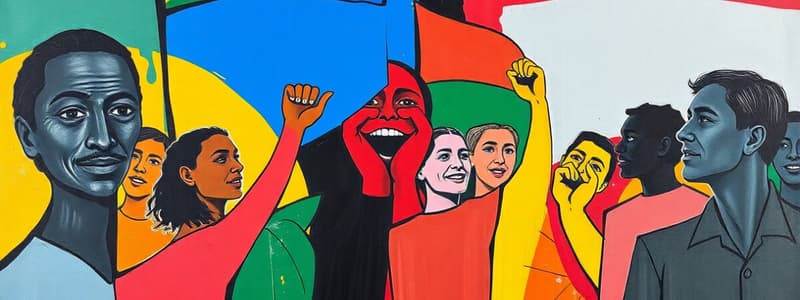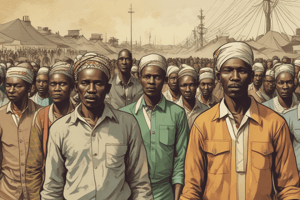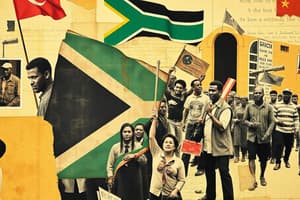Podcast
Questions and Answers
What was the primary reason for the British Equity union's discouragement of performances in South Africa?
What was the primary reason for the British Equity union's discouragement of performances in South Africa?
- To support the arts
- Increased financial opportunities
- Opposition to Apartheid (correct)
- Promotion of South African culture
Various American filmmakers distributed their films in South Africa during the 1980s.
Various American filmmakers distributed their films in South Africa during the 1980s.
False (B)
What was the main target of protests both in South Africa and abroad?
What was the main target of protests both in South Africa and abroad?
Sun City casino and entertainment complex
The academic boycott aimed to pressure South African universities to oppose _____ regime.
The academic boycott aimed to pressure South African universities to oppose _____ regime.
Which of the following artists performed at Sun City?
Which of the following artists performed at Sun City?
In what year did the boycott at Dunnes Stores begin?
In what year did the boycott at Dunnes Stores begin?
The Irish Congress of Trade Unions initially supported the Dunnes Stores workers' strike.
The Irish Congress of Trade Unions initially supported the Dunnes Stores workers' strike.
Who argued that universities could have done more against Apartheid?
Who argued that universities could have done more against Apartheid?
Match the following terms with their descriptions:
Match the following terms with their descriptions:
Who returned to South Africa in 1990 and became a member of the ANC delegation for negotiations?
Who returned to South Africa in 1990 and became a member of the ANC delegation for negotiations?
The Irish government announced a boycott of coal and food products from __________.
The Irish government announced a boycott of coal and food products from __________.
The academic boycott had a significant positive effect on South Africa's scientific research.
The academic boycott had a significant positive effect on South Africa's scientific research.
What significant action did the Irish government take in 1986 against South Africa?
What significant action did the Irish government take in 1986 against South Africa?
Match the following sports with their participation during Apartheid:
Match the following sports with their participation during Apartheid:
The anti-Apartheid movement was universally supported by the Irish public.
The anti-Apartheid movement was universally supported by the Irish public.
In what year did Kader Asmal attend the unveiling of a plaque in Ireland?
In what year did Kader Asmal attend the unveiling of a plaque in Ireland?
What was a major concern of the British public regarding goods boycotts against South Africa?
What was a major concern of the British public regarding goods boycotts against South Africa?
Margaret Thatcher supported the implementation of sanctions against South Africa.
Margaret Thatcher supported the implementation of sanctions against South Africa.
What was the main goal of the British anti-Apartheid movement?
What was the main goal of the British anti-Apartheid movement?
The anti-Apartheid movement held a concert at ________ Stadium to demand Nelson Mandela’s release.
The anti-Apartheid movement held a concert at ________ Stadium to demand Nelson Mandela’s release.
Match the following events with their corresponding descriptions:
Match the following events with their corresponding descriptions:
Which of the following tactics did the Irish anti-Apartheid movement promote?
Which of the following tactics did the Irish anti-Apartheid movement promote?
Kader Asmal was a prominent figure in the Irish anti-Apartheid movement.
Kader Asmal was a prominent figure in the Irish anti-Apartheid movement.
The anti-Apartheid movement in Britain contributed to the unbanning of the ANC and the PAC in ________.
The anti-Apartheid movement in Britain contributed to the unbanning of the ANC and the PAC in ________.
In which year was South Africa re-admitted to the Olympic Games after its isolation?
In which year was South Africa re-admitted to the Olympic Games after its isolation?
The Gleneagles Agreement endorsed stronger sporting ties with South Africa.
The Gleneagles Agreement endorsed stronger sporting ties with South Africa.
What was the primary reason for the cultural boycott of South Africa during the Apartheid years?
What was the primary reason for the cultural boycott of South Africa during the Apartheid years?
Peter Hain led opposition in Britain against South African sports tours and was involved with an organization called ______.
Peter Hain led opposition in Britain against South African sports tours and was involved with an organization called ______.
Match the following events or terms with their descriptions:
Match the following events or terms with their descriptions:
What was one of the reasons that led to South Africa's isolation in cricket?
What was one of the reasons that led to South Africa's isolation in cricket?
South Africa did not compete in the Olympic Games in ______ in 1964.
South Africa did not compete in the Olympic Games in ______ in 1964.
Rugby faced more isolation than other sports in South Africa during Apartheid.
Rugby faced more isolation than other sports in South Africa during Apartheid.
What was the primary goal of the British anti-Apartheid movement when it was founded in 1959?
What was the primary goal of the British anti-Apartheid movement when it was founded in 1959?
The British anti-Apartheid movement was successful in fully isolating South Africa by the late 1970s.
The British anti-Apartheid movement was successful in fully isolating South Africa by the late 1970s.
What significant event in March 1960 galvanized support for the anti-Apartheid movement in Britain?
What significant event in March 1960 galvanized support for the anti-Apartheid movement in Britain?
The British government stopped selling ________ to South Africa in 1963 as a response to the anti-Apartheid movement.
The British government stopped selling ________ to South Africa in 1963 as a response to the anti-Apartheid movement.
Which political party in Britain declared 1960 as 'Africa Year' and promoted the boycott of South African goods?
Which political party in Britain declared 1960 as 'Africa Year' and promoted the boycott of South African goods?
Some believed that South Africa's policies were a threat to world peace and that external intervention was necessary.
Some believed that South Africa's policies were a threat to world peace and that external intervention was necessary.
What two main questions were raised regarding the isolation of South Africa?
What two main questions were raised regarding the isolation of South Africa?
Match the following organizations or events with their significance to the anti-Apartheid movement:
Match the following organizations or events with their significance to the anti-Apartheid movement:
Flashcards
British Anti-Apartheid Movement
British Anti-Apartheid Movement
A boycott movement founded in 1959 to oppose Apartheid.
Sharpeville Massacre
Sharpeville Massacre
A 1960 incident where police killed 69 anti-Apartheid protesters in Sharpeville.
Economic Sanctions
Economic Sanctions
Trade bans imposed to pressure South Africa to end Apartheid.
Labour Party's Africa Year
Labour Party's Africa Year
Signup and view all the flashcards
ANC and PAC
ANC and PAC
Signup and view all the flashcards
International Sympathy
International Sympathy
Signup and view all the flashcards
UN Involvement
UN Involvement
Signup and view all the flashcards
Internal Affairs Argument
Internal Affairs Argument
Signup and view all the flashcards
Black Africans and job loss
Black Africans and job loss
Signup and view all the flashcards
Margaret Thatcher's approach
Margaret Thatcher's approach
Signup and view all the flashcards
ANC and PAC unbanning
ANC and PAC unbanning
Signup and view all the flashcards
Cancellation of the 1970 Springbok tour
Cancellation of the 1970 Springbok tour
Signup and view all the flashcards
Irish anti-Apartheid movement
Irish anti-Apartheid movement
Signup and view all the flashcards
Kader Asmal's role
Kader Asmal's role
Signup and view all the flashcards
Boycotts and sports
Boycotts and sports
Signup and view all the flashcards
Dunnes Stores Strike
Dunnes Stores Strike
Signup and view all the flashcards
Anti-Apartheid Boycott
Anti-Apartheid Boycott
Signup and view all the flashcards
Kader Asmal
Kader Asmal
Signup and view all the flashcards
Irish Congress of Trade Unions
Irish Congress of Trade Unions
Signup and view all the flashcards
Sporting Boycott
Sporting Boycott
Signup and view all the flashcards
International Lobby
International Lobby
Signup and view all the flashcards
Economic Isolation
Economic Isolation
Signup and view all the flashcards
1986 Boycott Announcement
1986 Boycott Announcement
Signup and view all the flashcards
South Africa and the Olympics
South Africa and the Olympics
Signup and view all the flashcards
Montreal Olympics 1976 Boycott
Montreal Olympics 1976 Boycott
Signup and view all the flashcards
Gleneagles Agreement
Gleneagles Agreement
Signup and view all the flashcards
Basil D'Oliveira Incident
Basil D'Oliveira Incident
Signup and view all the flashcards
Isolation of South African Cricket
Isolation of South African Cricket
Signup and view all the flashcards
Cultural Boycott of Apartheid
Cultural Boycott of Apartheid
Signup and view all the flashcards
HART Organization
HART Organization
Signup and view all the flashcards
Opposition to South African Sports Tours
Opposition to South African Sports Tours
Signup and view all the flashcards
British Equity's stance
British Equity's stance
Signup and view all the flashcards
Cultural isolation
Cultural isolation
Signup and view all the flashcards
Sun City controversy
Sun City controversy
Signup and view all the flashcards
Academic boycott
Academic boycott
Signup and view all the flashcards
Arguments against the academic boycott
Arguments against the academic boycott
Signup and view all the flashcards
Desmond Tutu's view
Desmond Tutu's view
Signup and view all the flashcards
Impact on science and medicine
Impact on science and medicine
Signup and view all the flashcards
International sanctions
International sanctions
Signup and view all the flashcards
Study Notes
Anti-Apartheid Movements in Britain and Ireland
- The British anti-apartheid movement began in 1959 as a boycott campaign, initially aiming to discourage the purchase of South African goods.
- This expanded to actively opposing Apartheid in South Africa.
- The Labour Party supported the boycott campaign, promoting it as "Africa Year" in 1960.
- British companies were encouraged to reduce the amount of South African goods they sold.
- The Sharpeville Massacre in 1960 galvanized the movement, prompting calls for economic sanctions.
- Britain ended arms sales to South Africa in 1963.
- The movement collaborated with the UN to isolate the South African government.
- Progress was slower than activists hoped, but the campaign persisted.
- Internal debate existed within the movement concerning the extent of involvement in South Africa.
- Concerns were raised about potential harm to Black South Africans resulting from boycotts.
- Factors like personal ties to South Africa and business interests played a role in the varying responses.
Irish Anti-Apartheid Movement
- The Irish anti-apartheid movement was initially an extension of the British movement but developed a distinct identity.
- Key figures such as Kader Asmal played a significant role.
- The movement's momentum significantly grew, with protests and boycotts, particularly of goods.
- A cashier at Dunnes Stores refused to sell South African fruit, leading to a two-and-a-half-year strike by Dunnes workers, which eventually gained support from the Irish Congress of Trade Unions.
- The Irish government, in 1986, boycotted coal and South African food products.
- The movement's pressure contributed to a decline in South African relations.
Sports Boycott
- A boycott was enforced against South African sports teams, aiming to pressure the South African government.
- The South African sports teams were effectively banned from participating in international events to international sports tournaments.
Cultural Boycott
- The cultural boycott targeted events, businesses, and creative works related to South Africa.
- This included various activities and boycotts of entertainment venues like Sun City, and the cessation of importing TV programs from the country.
Academic Boycotts
- Academic institutions and academics increasingly protested South Africa's policies.
- The boycott aimed to exert pressure on South Africa by limiting academic collaborations and academic activities.
Studying That Suits You
Use AI to generate personalized quizzes and flashcards to suit your learning preferences.




